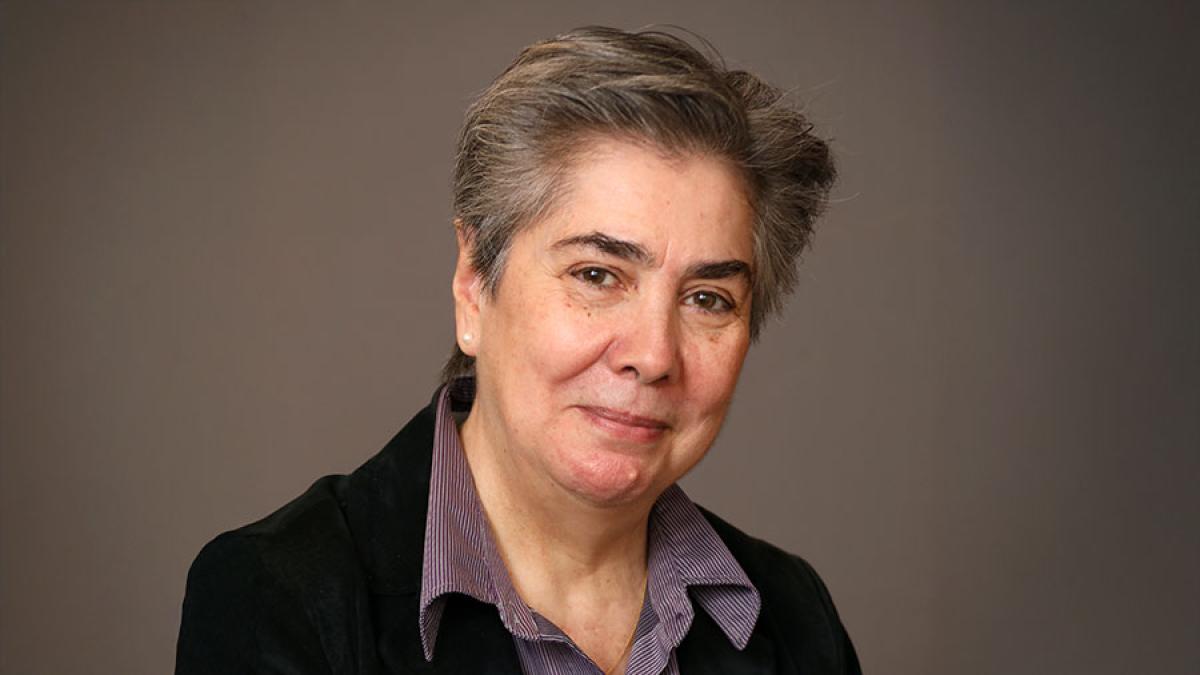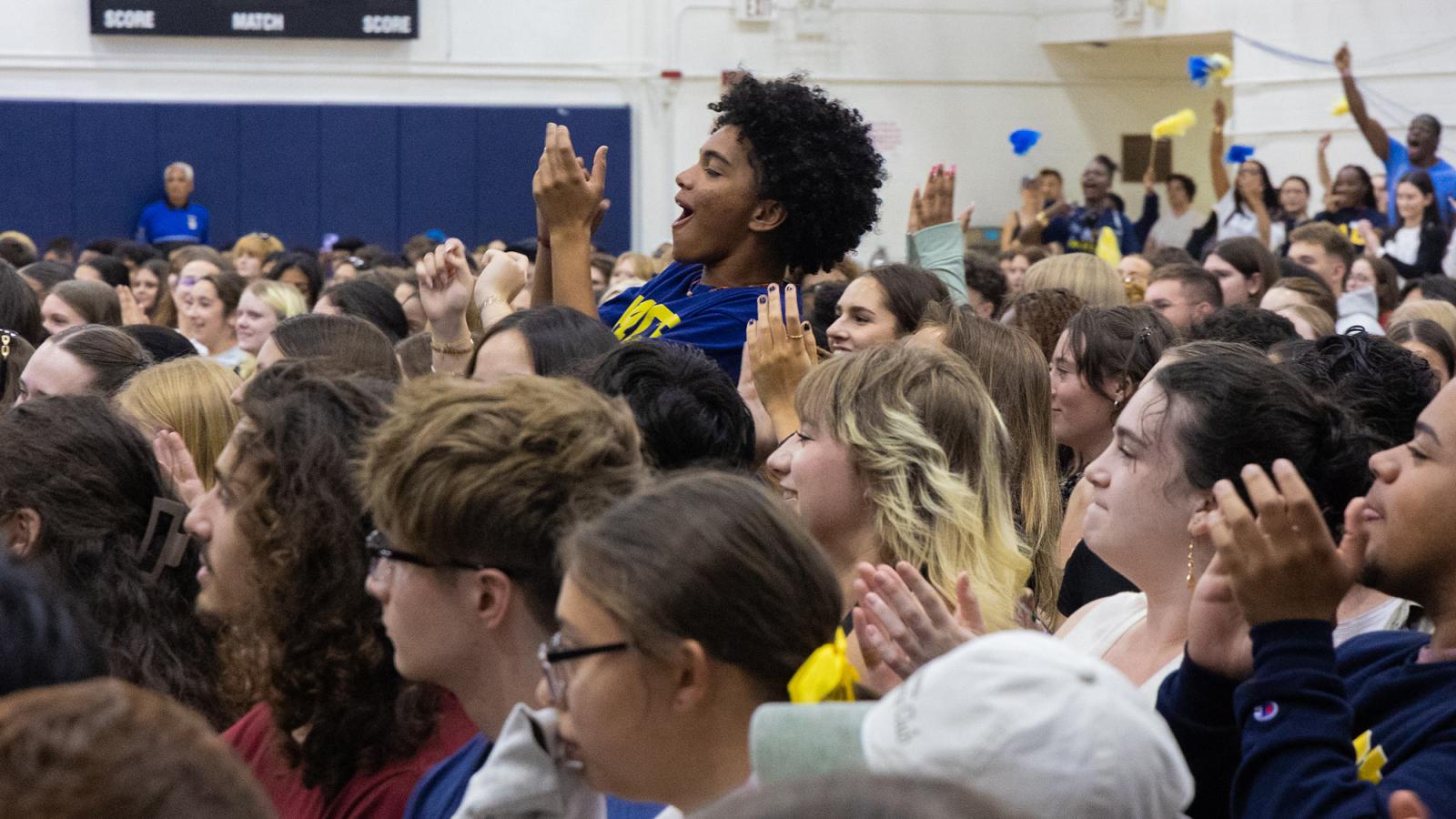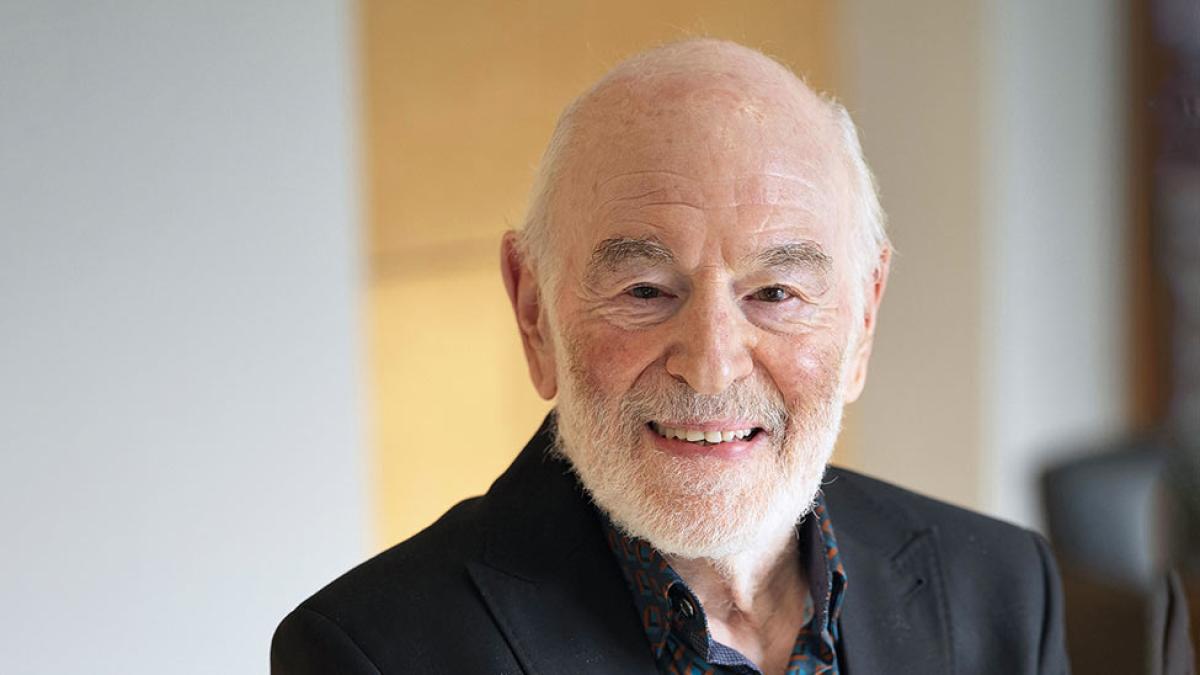
79-Year-Old New York Woman Has Participated In Every Komen Greater New York City Race For The Cure
For 35 years, thousands have gathered in Central Park for the Komen Greater New York City Race for the Cure — and Pace University has been there every step of the way. Thanks to the leadership of Dr. Ellen Mandel, who has proudly participated in all 35 races, Pace continues to show up in force as the largest university team year after year, joining the fight to end breast cancer.
Press Release: Pace University Art Gallery Presents Equilibrium: An Immersive Reflection on Ecology and Resilience
This fall, Pace University Art Gallery will present Equilibrium, a solo exhibition by interdisciplinary artist Mary Mattingly. Featuring living sculpture, photography, and performance, the exhibition explores themes of ecological transformation, resource equity, and climate adaptation. The exhibition opens with a free public reception on Friday, September 26 from 5:00 p.m. to 7:00 p.m.


Immersive installation by Mary Mattingly transforms the gallery into a living laboratory for ecological imagination, resilience, and climate adaptation
This fall, Pace University Art Gallery will present Equilibrium, a solo exhibition by interdisciplinary artist Mary Mattingly. Featuring living sculpture, photography, and performance, the exhibition explores themes of ecological transformation, resource equity, and climate adaptation. The exhibition opens with a free public reception on Friday, September 26 from 5:00 p.m. to 7:00 p.m.
Known for her ambitious civic projects that merge art, environmental inquiry, and community engagement, Mattingly reimagines the gallery as a collaborative laboratory — a space for co-learning, foraging, cultivation, and speculative reflection aimed at developing shared solutions.
“Since 2001, I’ve lived in New York City, creating sculptural ecosystems that prioritize access to food, shelter, and water,” said Mattingly. “My work often takes the form of participatory initiatives rooted in care, ecological awareness, and collective imagining.”
Equilibrium brings together several ongoing and interconnected bodies of work, including a new site-specific work now in development and Rooted, a living installation composed of plant species selected for their resilience in flood-prone environments like New York City—particularly those affected by saltwater intrusion. The exhibition also includes Salt Forms, sculptural steel discs that accumulate crystalline salt after being submerged in the city’s brackish waterways. Building on the theme of flooding, Mattingly presents buoy bundles and submerged books from her House and Universe series, evoking themes of knowledge loss, overconsumption, and climate-driven decay.
In addition, the exhibition highlights documentation from Swale, Mattingly’s groundbreaking floating food forest project that challenged food access policies by allowing New Yorkers to freely harvest edible plants from a repurposed barge. The show will also present Night Gardens, a series of photographic collages portraying mythic and adaptive gardens shaped by ecological memory, inviting viewers to reconsider the garden as a space of resilience, disruption, and renewal.
The exhibition also includes an artist talk with Mattingly on Thursday, October 23, at 2:00 p.m. Equilibrium, which remains on view through Saturday, November 1, 2025, is made possible by the New York State Council on the Arts with the support of the Office of the Governor and the New York State Legislature. All the gallery’s exhibits and events are free and open to the public. The gallery is in Lower Manhattan at 41 Park Row.
About the Artist
Mary Mattingly is an interdisciplinary artist whose work explores ecological relationships through sculptural ecosystems and collage. Her public projects, such as Swale, a floating food forest in New York City’s waterways; Waterpod, a self-sufficient living structure on a barge; and the Flock House Project, a series of mobile habitats, address urgent issues around water, food systems, and climate adaptation. Mattingly’s work has been exhibited at the Brooklyn Museum, Storm King Art Center, the International Center of Photography, the Barbican, Seoul Art Center, and the Palais de Tokyo. She has received fellowships and residencies from the Guggenheim Foundation, the Yale School of Art, A Blade of Grass, and the Anchorage Museum among others. Her work has been featured in Art21, The New York Times, and Le Monde. At the core of Mattingly’s practice is a belief in art as a form of investigation and a tool for imagination.
About the Pace University Art Gallery
Founded with the conviction that art is integral to society, the Pace University Art Gallery is a creative laboratory and exhibition space that supports innovation and exploration for both artists and viewers. Open to students, staff, and faculty from across the Pace campuses and, equally, to the Lower Manhattan community and visitors from around the world, the Art Gallery encourages personal investigation and critical dialogue via thought-provoking contemporary art exhibits and public programming. Enhancing the Art Department’s Bachelor of Arts and Bachelor of Fine Arts programs, the Art Gallery offers students real-world opportunities to exhibit their own art and to work directly with professional artists to install and promote exhibitions. All exhibits and events are free and open to the public.
About Dyson College of Arts and Science
Pace University’s liberal arts college, Dyson College, offers more than 50 programs, spanning the arts and humanities, natural sciences, social sciences, and pre-professional programs (including pre-medicine, pre-veterinary, and pre-law), as well as many courses that fulfill core curriculum requirements. The College offers access to numerous opportunities for internships, cooperative education and other hands-on learning experiences that complement in-class learning in preparing graduates for career and graduate/professional education choices.
About Pace University
Since 1906, Pace University has been transforming the lives of its diverse students—academically, professionally, and socioeconomically. With campuses in New York City and Westchester County, Pace offers bachelor, master, and doctoral degree programs to 13,600 students in its College of Health Professions, Dyson College of Arts and Sciences, Elisabeth Haub School of Law, Lubin School of Business, Sands College of Performing Arts, School of Education, and Seidenberg School of Computer Science and Information Systems.
Elisabeth Haub School of Law at Pace University Hosts Twelfth Annual Future Environmental Law Professors Workshop
On September 5, 2025, the Elisabeth Haub School of Law at Pace University hosted the twelfth annual Future Environmental Law Professors Workshop. The workshop is designed for law students and graduates considering or planning careers as legal academics in environmental law broadly defined. The workshop included an informational panel, mock interviews, and practice job talks. In addition, this year Professor Rachel Rothschild, recipient of the 2025 Haub Environmental Law Distinguished Junior Scholar Award, delivered the keynote lunch address.


On September 5, 2025, the Elisabeth Haub School of Law at Pace University hosted the twelfth annual Future Environmental Law Professors Workshop. The workshop is designed for law students and graduates considering or planning careers as legal academics in environmental law broadly defined. The workshop included an informational panel, mock interviews, and practice job talks. In addition, this year Professor Rachel Rothschild, recipient of the 2025 Haub Environmental Law Distinguished Junior Scholar Award, delivered the keynote lunch address.
“This workshop is designed to help current and future academics prepare for the environmental law academic teaching market,” said Pace Haub Law Professor Margot Pollans. “We bring together current environmental faculty from all stages in their careers to provide insight into the market process. The event is open to anyone considering a career as an environmental law professor. I’m grateful to my colleagues who show up year after year and generously offer their time and expertise to those seeking to join our ranks.” Professor Pollans joined the Pace Haub Law faculty in 2015. She is the Faculty Director of the Pace Food Law Center and the current Joseph P. D’Alessandro Faculty Scholar. Previously, she was the James D. Hopkins Professor of Law for the 2023–2025 academic years and served as the Shamik and Adrienne Trivedi Faculty Scholar from 2020–2022.
This year’s workshop kicked off with introductory remarks by Professor Pollans, followed by a panel discussion and Q&A on “Navigating the Environmental Law Professor Job Market,” followed by mock screening interviews. This year’s keynote address began with the presentation of the 2025 Haub Environmental Law Distinguished Junior Scholar Award to Professor Rachel Rothschild, Assistant Professor of Law, University of Michigan Law School. Professor Rachel Rothschild is an assistant professor of law at the University of Michigan Law School. Before joining the Michigan Law faculty, she was a legal fellow at the Institute for Policy Integrity. From 2015 to 2017, she was an assistant professor and faculty fellow at New York University’s Gallatin School of Individualized Study. Professor Rothschild’s scholarship sits at the intersection of environmental law, history, and policy. Her recent research examines climate change law and policy as well as the past and present regulation of toxic substances.
In the afternoon, workshop participants who are on the market this year shared mini versions of their job talks and received feedback from faculty and other participants. Topics ranged from discrimination in housing markets, to green burial practices, to the intersections of environmental law and financial markets. In addition to numerous Pace Haub Law School environmental law professors, the President and Dean of Albany Law School along with professors from Albany Law School, Cardozo School of Law, Fordham Law School, The Ohio State University Moritz College of Law, University of Michigan Law School, NYU School of Law, University of Connecticut School of Law, and more participated in this year’s workshop. The workshop concluded with a closing reception.
MS in Publishing Director Featured in Publisher’s Weekly on Strengths of Pace’s Program
Clinical Associate Professor and Director of Pace’s MS in Publishing program Manuela Soares, PhD, was featured in an article in Publisher’s Weekly, as the program celebrates its 40th anniversary and enrolled nearly 100 students in the 2024-25 academic year across various degree tracks and accessibility options.

Clinical Associate Professor and Director of Pace’s MS in Publishing program Manuela Soares, PhD, was featured in an article in Publisher’s Weekly, as the program celebrates its 40th anniversary and enrolled nearly 100 students in the 2024-25 academic year across various degree tracks and accessibility options.
In the article, Soares, who has directed the program for seven years, discusses the competitive strengths of the program, in addition to its response to current industry challenges.
She touts the program’s affordability; its industry-drawn faculty; student mentoring and networking opportunities with professionals, alumni, and industry groups; a dedicated full-time faculty member to place students in internships; student representation each year at the Frankfurt and London Book Fairs; and access to The Publishing Lab, an annual journal allowing students to handle the entire publishing workflow.
Soares is an industry veteran who has directly witnessed the transformation of the publishing industry from strictly analog to one that is increasingly digital. In spite of these technological challenges, the MS in Publishing program continues to endure, with 1,000+ alumni since its inception in 1985.
She said, “To succeed in publishing, you need to be able to adapt.” To this end, she is teaching a new ethics course that addresses contemporary challenges—from political polarization to technological disruptions such as AI—facing the industry.
Ultimately, according to Soares, the key element to success in publishing is skillful storytelling.
“What it all comes down to is the ability of a storyteller to intrigue someone, to move them emotionally. That is what matters and that is what will last."
Press Release: Pace University Welcomes Class of 2029 at Convocation
Pace University recently hosted Convocation on two of its campuses: New York City and Pleasantville in Westchester County. The annual tradition formally welcomes first-year and transfer students to the University community and marks the beginning of the 2025–2026 academic year.


Pace kicks off the academic year with growth in academic areas such as health science, business management, film and screen studies, and more
Pace University recently hosted Convocation on two of its campuses: New York City and Pleasantville in Westchester County. The annual tradition formally welcomes first-year and transfer students to the University community and marks the beginning of the 2025–2026 academic year.
As student performers, faculty, and staff cheered on new arrivals, the tone was set for a year defined by purpose and connection. The two-day program included music, student-led reflections, remarks from senior leadership, and the ceremonial presentation of class pins.
“You are now part of a community that will challenge you, support you, and help you grow in ways you can’t yet imagine,” said President Marvin Krislov. “And while the start of something new may feel a little overwhelming, you should know this: you belong here, and you are ready.”
“At Pace, opportunity means more than just access to education—it’s about responsibility, growth, and making choices that shape your future,” President Krislov added. “Ask questions. Take care of yourself. And know that we’re here to help you succeed every step of the way.”
This fall, early indicators show strong momentum across campuses. Pleasantville is experiencing notable gains, with total applications up 13% and housing deposits up 17% from last year. Lubin School of Business enrollments are trending upward on both campuses, with a 63% increase in finance major deposits University-wide—including a 116% spike in Pleasantville.
Across the board, Pace is seeing growth in high-interest majors including health science, nursing, business management, arts and entertainment management, film and screen studies, political science, criminal justice, and game development.
Students in the Class of 2029 hail from 46 states, two U.S. territories, and 60 countries—underscoring Pace’s broad geographic reach and diverse student body.
In their remarks, student leaders reflected on their own journeys and encouraged the incoming class to find community and purpose through connection and involvement.
“Pace has been more than a university—it’s been a launchpad for growth, community, and purpose,” said Nick Diaz, president of the Student Government Association in Pleasantville. “When I look back on the challenges and triumphs of the past three years, I see how this community lifted me up and helped shape the leader I am today.”
“Reaching your full potential doesn’t mean having all the answers—it means showing up, trying, and saying yes to the opportunities around you,” said Mason Bray, president of the Student Government Association in New York City. “That’s how I found community and purpose here at Pace, and it’s how you will too.”
Students also shared their excitement and aspirations as they begin their college careers.
“Pace instantly felt like the right place for me—with a great marketing program, an amazing cheer team, and so many ways to get involved,” said Ryann Robinson, a first-year marketing major from Washingtonville, N.Y. “Convocation was inspiring—it made me feel like I’m really part of something, and now I can’t wait to dive in.”
“Coming to New York City to study musical theatre has been a dream, and Pace is where I know I can grow into the artist I want to be,” said Hayden Poe, a first-year musical theatre student from Dalton, Georgia. “Convocation reminded me that I’m not alone—I’m surrounded by people who are just as passionate and ready to make their mark.”
About Pace University
Since 1906, Pace University has been transforming the lives of its diverse students—academically, professionally, and socioeconomically. With campuses in New York City and Westchester County, Pace offers bachelor, master, and doctoral degree programs to 13,600 students in its College of Health Professions, Dyson College of Arts and Sciences, Elisabeth Haub School of Law, Lubin School of Business, Sands College of Performing Arts, School of Education, and Seidenberg School of Computer Science and Information Systems.
CRJ Professor and Chair Lavery pens op-ed in The Hill on Epstein survivors stepping forward
Professor and Chair of the Criminal Justice and Security Cathryn Lavery, PhD, had an op-ed piece on the courage of Jeffrey Epstein’s survivors and the broader implications for how our criminal justice system treats victims published in The Hill.

Professor and Chair of the Criminal Justice and Security Cathryn Lavery, PhD, had an op-ed piece on the courage of Jeffrey Epstein’s survivors and the broader implications for how our criminal justice system treats victims published in The Hill.
The article underscores the systemic failures that allowed exploitation to persist, while also emphasizing the urgent need for reforms that protect, believe, and support survivors of trafficking and sexual violence. According to Lavery, when survivors of Epstein step forward, it’s not merely a personal act, but also a political one that challenges entrenched power, demanding accountability from institutions that too often silence or dismiss victims.
In The Hill piece, she also discusses how coverage on the courage of Epstein’s survivors needs to go beyond momentary headlines and be followed by real change.
This involves training law enforcement in trauma-informed practices; courtroom protections for survivors, such as shield law and confidential testimony; the providing of long-term resources, such as stable housing, mental health care and job training, so that lives may be rebuilt; and, finally, accountability of the system itself; that is, a willingness to confront those with power and wealth who finance trafficking and sexual violence.
Is Trump Engaging In Political Prosecution — And Can He Get Away With It?
Elisabeth Haub School of Law Professor Bennett Gershman pens an op-ed in The Hill about President Donald Trump’s political prosecutions, examining the legal and constitutional implications while highlighting the potential threats to the integrity of the justice system.

Inside City Hall
Dyson Political Science Professor Laura Tamman joined Errol Louis on Spectrum News NY1’s Inside City Hall to analyze the latest developments in the mayoral race. Professor Tamman noted that independent candidate Jim Walden’s withdrawal likely benefits Andrew Cuomo, given their overlapping voter bases. She added that the race is consolidating, with a likely one-on-one matchup between Cuomo and Mondani.
Students Move In As Enrollment Ticks Up At Pace University
News 12 Westchester visited Pace’s Pleasantville campus to speak with excited students and report on Pleasantville’s enrollment gains—first-year applications are up 15%, first-year (domestic) enrollment rose 12%, and total enrollment increased 6% compared to last year— and News Break has the story.
What Evidence Links Alleged Gilgo Beach Killer To More Victims?
In the Long Island Press, Professor Bennett Gershman provides insight into the Gilgo Beach investigation, highlighting the role of circumstantial evidence in connecting the suspect to additional victims.